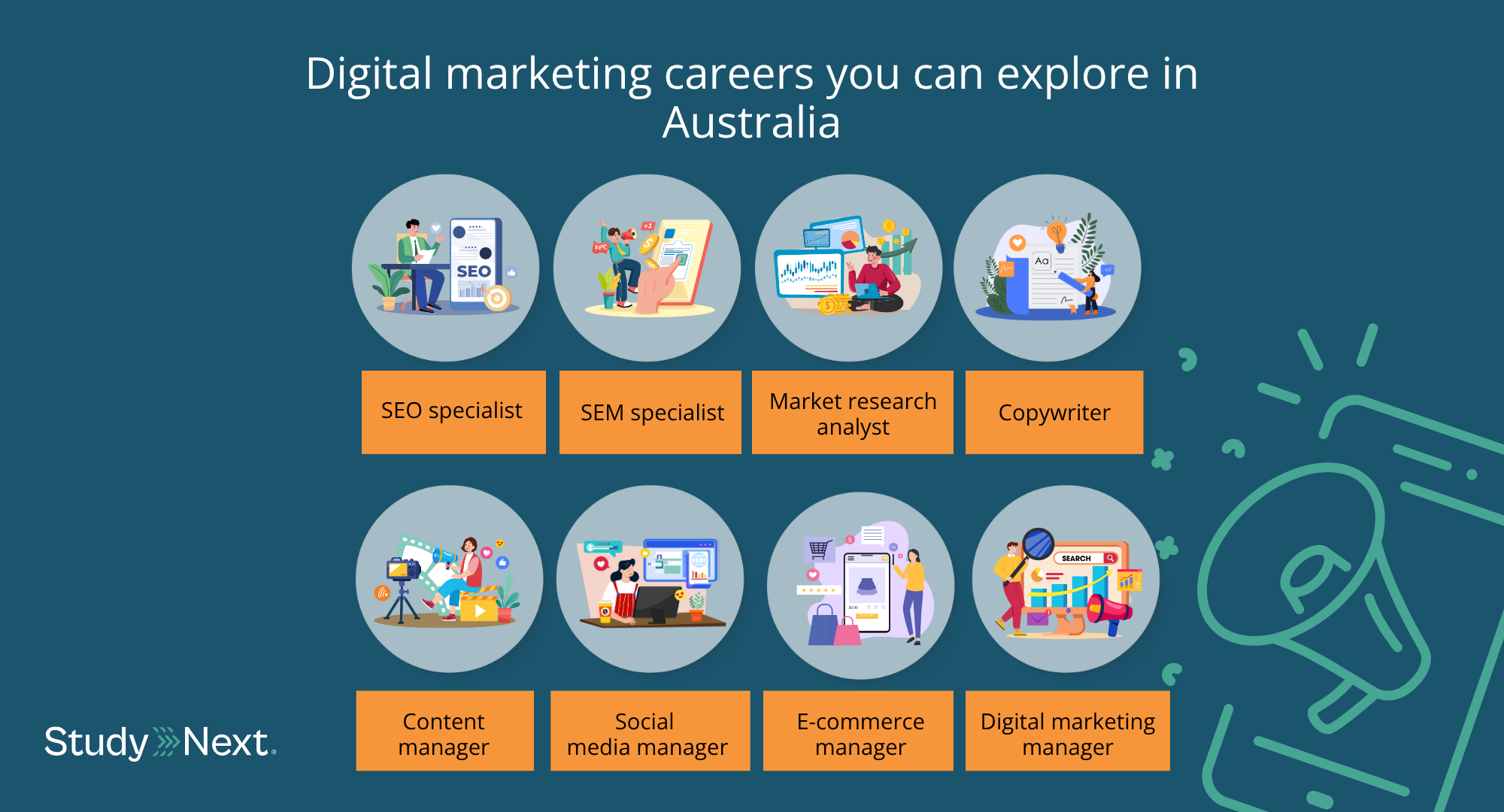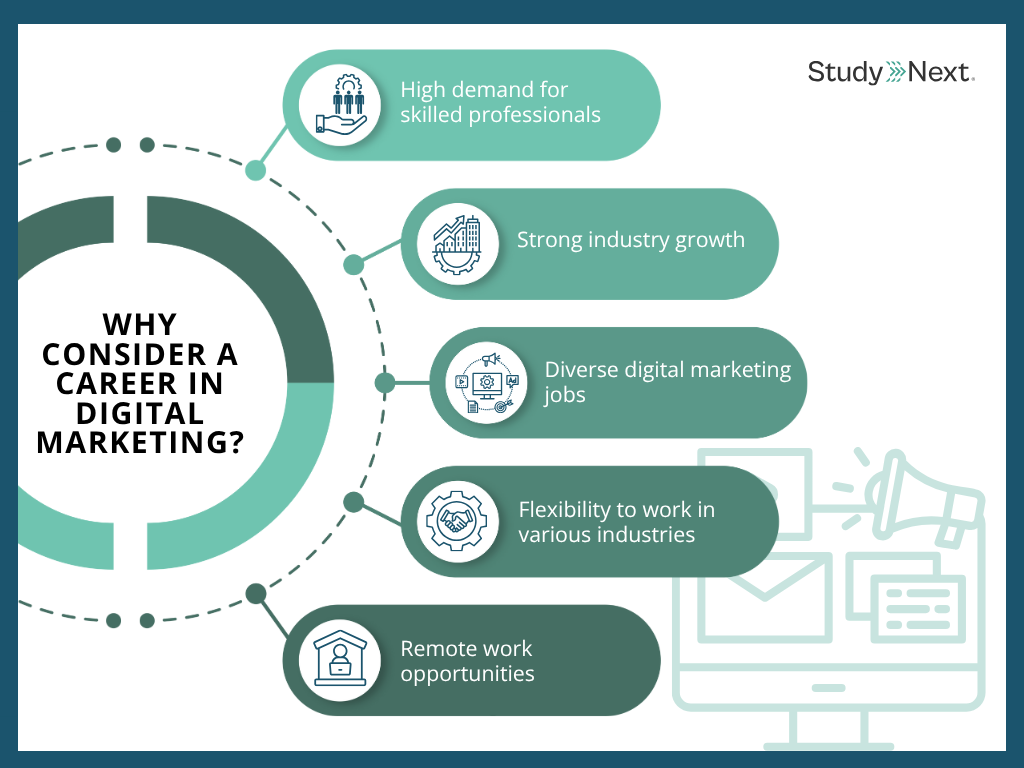In This Article

Are you aiming for a career in digital marketing? With so many exciting roles available in this fast-evolving field, it can be challenging to determine which job aligns best with your interests and skills.
In this article, we delve into a range of digital marketing jobs you can consider. We also explore the key skills needed to thrive in these positions and how you can advance yourself professionally in this industry.
What is a digital marketing career?
A digital marketing career involves promoting brands, products or services using online platforms like search engines, email, social media and websites. Through these channels, digital marketers employ strategies to connect and engage with current and potential customers, enhance brand awareness and generate leads. Many of these professionals also analyse data to examine marketing performance to identify what’s working and where improvements are needed.
Depending on their role and company they work for, a digital marketer may manage various marketing activities within their organisation or specialise in a specific area, such as paid advertising, social media management or search engine optimisation (SEO). Ultimately, the goal of a digital marketing professional is to enhance a company's online presence, driving growth and supporting its overall business objectives.
8 digital marketing careers you can explore
You can find diverse digital marketing careers across Australia, including SEO specialist, content manager, social media manager and digital marketing manager. Professionals in these roles utilise online platforms to reach target audiences and create strategies to promote their business’s offerings. Discover more about their responsibilities, work environment and average salaries, as reported by SEEK.

SEO specialist
SEO specialists focus on boosting an organisation’s online presence organically by improving its website ranking on search engines, where many consumers begin their purchase journey. The higher a site appears in search results, the more likely it is to attract clicks and convert visitors into customers. In this role, you come up with strategies to attract targeted traffic and generate leads. This includes optimising content with specific keywords, refining website structure and improving internal links and backlinking.
As an SEO specialist, you may work within an organisation’s marketing team, collaborating with UX designers, content strategists, writers and marketing managers. You may also work independently or in a consulting firm, supporting multiple clients.
Average salary: $80,000 to $100,000 per year
Search engine marketing (SEM) specialist
SEM specialists manage paid advertising campaigns on search engines to enhance brand visibility and drive targeted traffic to websites. Unlike SEO, which focuses on organic search, SEM is centred on paid search, usually through pay-per-click (PPC) campaigns supported by platforms like Google Ads. Common responsibilities of this role may include researching keywords relevant to the business and its targeted audience, setting bid strategies for how much to pay per click and building the structures of PPC campaigns. After launching your campaign, you monitor it regularly and make necessary adjustments to optimise results and maximise return on investment.
SEM specialists typically work for digital marketing agencies or are employed in-house by a business with a strong digital presence. You may also choose to work as a freelancer or contractor, offering your expertise to small businesses, startups or marketing teams.
Average salary: $85,000 to $95,000 per year
Market research analyst
A market research analyst leverages data to help businesses identify their target customers and develop effective strategies to promote their products or services. This usually involves monitoring industry trends and examining data on consumers, competitors and overall market conditions. Your findings can be used to support data-driven decisions that ensure digital marketing activities align with evolving consumer preferences.
In this role, you typically work with other digital marketing professionals like SEO and content specialists to help refine marketing strategies, optimise content and improve campaign targeting. If you’re working as a consultant or in an agency, you’ll work with clients to understand their market position and offer tailored recommendations to help with their decision-making.
Average salary: $85,000 to $95,000 per year
Copywriter
Copywriters in digital marketing research, develop and produce written content with the intention of advertising an organisation’s products or services. In this role, you leverage your writing and communication skills to positively influence how readers perceive your brand. You may create copy for diverse channels, including blog posts, emails and online catalogues. This job involves thorough research to identify key selling points, determine what tone of voice suits the targeted audience and develop copy that can resonate with them. You may also use marketing data to guide your creative decisions.
Copywriters are essential in businesses that leverage content to connect with customers, giving you the opportunity to work across diverse industries. Whether you’re hired as an in-house writer or freelancer, you’ll likely work closely with marketing teams and other creative professionals to create effective digital marketing material.
Average salary: $80,000 to $100,000 per year
Content manager
Content managers play a key role in developing, publishing and optimising website content to support an organisation’s marketing goals. This typically begins with researching target markets and understanding consumer behaviour, followed by creating content that can appeal and connect with the audience. You will usually rely on a content management system (CMS) to streamline the creation, editing and publishing process. Once content is live, you evaluate its performance by monitoring key metrics like visitor traffic and user behaviour.
Content managers often work within an organisation’s marketing team or in digital agencies, managing content strategies for multiple clients. If you’re leading a team of writers, you may focus less on writing content and more on reviewing, publishing, optimising and managing it. Besides writers, you may also work closely with other professionals, including advertising representatives, web developers, account managers, graphic designers and social media managers to ensure cohesive messaging in marketing campaigns.
Average salary: $90,000 to $110,000 per year
Social media manager
As a social media manager, you help organisations develop and execute social media strategies to increase customer engagement. Having a positive online presence on these platforms can lead to stronger brand awareness and reputation. Some common responsibilities include generating engaging social media content like written posts and video content, managing a content calendar to post consistently across various platforms and monitoring social media pages for user feedback and comments.
If you work independently in social media management, you may work with business owners, product managers and agencies to plan and create content for their social media pages. You may also work with influencers and brand partners to extend your client’s reach and build credibility among new and existing audiences. For in-house roles, you usually collaborate with the marketing team, SEO specialists and public relations executives to amplify marketing efforts.
Average salary: $85,000 to $105,000 per year
E-commerce manager
An e-commerce manager oversees a company's online retail operations, ensuring a positive user experience and converting website visitors into paying customers. This role involves a wide range of tasks, including managing product listings, optimising website functionality and coordinating digital marketing campaigns to drive traffic and boost sales. You may also track key performance metrics and monitor customer feedback to develop strategies that enhance user experience and increase revenue.
E-commerce managers usually work in retail companies, e-commerce businesses or as freelancers. In this role, you typically work with teams across different functions, such as information technology (IT) and marketing, to improve website functionality and align its content with digital marketing campaigns. Since this is a managerial role, you’ll offer guidance to a team of e-commerce executives and oversee their daily activities.
Average salary: $100,000 to $120,000 per year
Digital marketing manager
Digital marketing managers are responsible for leading the development, execution and optimisation of marketing campaigns across various online platforms. With strong analytics skills, your goal is to improve an organisation’s brand perception, attract target audiences, generate leads and ultimately contribute to business growth. This role also involves staying on top of market trends to plan and implement effective strategies, including SEO, social media, email marketing and content marketing.
Digital marketing managers can often be found working in corporations, startups or agencies. You usually work together with professionals in cross-functional teams, including graphic designers, content writers, web developers and SEO specialists. You ensure that everyone is aligned with business goals while creating engaging digital marketing campaigns.
Average salary: $110,000 to $130,000 per year
Why consider a career in digital marketing?
You should consider a career in digital marketing due to the rising demand for skilled professionals and strong growth within the industry. As digital marketing is a crucial function across diverse sectors in today’s digital landscape, it provides you with opportunities to work in a wide range of industries. Many roles also offer remote or flexible work arrangements.
Find out more below:

High demand for skilled professionals
With the increasing demand for skilled professionals, now is an ideal time to consider a career in digital marketing. The 2024 Growing Australia’s Digital Workforce report by the Digital Skills Organisation revealed that Australia is expected to face a shortage of over 370,000 digitally skilled professionals by 2026. This gap highlights the increasing value of digital expertise in today’s job market. For aspiring digital marketers, this presents a strong and positive career outlook.
This is further supported by Jobs and Skills Australia reporting an annual employment growth of 4,300 advertising and marketing professionals over the past year. SEEK also forecasts that diverse careers in digital marketing, including positions like SEO specialist, SEM specialist, social media manager and digital marketing manager, will experience an impressive growth rate of over 11 per cent within the next five years. With strong growth projections and a clear demand for digital expertise, pursuing a career in digital marketing offers job stability in a rapidly -evolving industry.
Strong industry growth
Working in digital marketing can also offer great career growth, driven by the industry’s strong performance in recent years. KPMG’s 2025 report on the fastest growing jobs in Australia revealed that roles in marketing, advertising and public relations experienced a growth rate of 40.9 per cent from 2014 to 2024. The Australian Marketing Institute (AMI) also highlighted in its Digital 2024 Australia report that the national digital advertising spend grew from US$13.5 billion in 2023, which made up 72.4 per cent of total ad spend, to US$18.6 billion in 2024. This surge aligns with consumer behaviour trends in the report, which revealed that 86.5 per cent of Australians are on social media and more than half of them rely on these platforms to research brands and products. These insights demonstrate the growing importance of digital marketing in today’s economy, making it a promising career path for those entering the field.
Diverse digital marketing jobs
Digital marketing is a broad field offering a wide range of specialisations, including SEO, PPC, content strategy and email marketing. This variety allows you to align your career according to your strengths and interests, whether that’s data analysis, creative storytelling or audience engagement. With so many paths to explore, digital marketing provides the flexibility to grow and thrive in a role that provides both personal fulfilment and long-term career success.
Flexibility to work in various industries
As a digital marketer, you can explore career opportunities across diverse industries. In an increasingly digital world, many businesses of various sizes rely on digital channels to reach and engage with their target audiences as part of their overall marketing strategy. As more consumers go online, these companies need skilled professionals to promote their brand, products or services across these digital platforms. As a result, digital marketing skills are highly valued across many sectors, such as business, finance and technology. This offers you the flexibility to choose an industry that aligns with your strengths and interests.
Remote work opportunities
Since digital marketing activities are primarily conducted online, many roles in this field offer flexible schedules and remote work opportunities. Whether you're managing social media accounts, optimising websites for search engines or running paid advertising campaigns, these tasks can usually be done from anywhere with an internet connection. Working remotely often gives you more control over your schedule, which can lead to a healthier work-life balance. If you're a freelancer or contractor, it also gives you the opportunity to take on multiple clients and build a diverse portfolio.
What skills are important in a digital marketing career?
A thriving digital marketing career requires you to have a combination of hard skills, including data analysis, relevant technical capabilities and market research, and soft skills like communication, adaptability and creativity. Developing these capabilities can help you become versatile and well-rounded in your digital marketing job. Here’s why each of these skills is essential:
Hard skills
Data analysis: This skill involves gathering, examining and interpreting data from digital marketing activities to gauge performance and identify areas for improvement. Having this skill allows you to analyse website traffic, monitor engagement levels on social media and get insights to make informed decisions when crafting digital marketing strategies.
Technical proficiency: Working in digital marketing often requires you to have expertise with various digital tools and software. The specific technical skills you need can vary depending on your role. For example, an SEO specialist should be proficient in keyword research, backlink analysis and content optimisation using tools like Google Search Console, Ahrefs and Semrush.
Market research: As a digital marketer, performing research helps you assess consumer behaviour, examine competitors, find market gaps and keep up with industry trends. Understanding what your targeted audience is looking for enables you to tailor your marketing efforts and connect with customers through the right online channels.
Content management: As content is a fundamental component in many digital marketing strategies, knowing how to manage it is an important skill for digital marketers. This involves understanding content strategy, maintaining consistency in a brand’s voice and ensuring content remains relevant and engaging across all platforms.
Soft skills
Communication: You need to have strong verbal and written communication skills as you will be working with various stakeholders, such as clients and cross-functional teams, to build effective marketing strategies. A skilled communicator can also develop and deliver compelling marketing messages that resonate with both current and potential customers.
Creativity: To help your brand stand out among competitors, it’s important for you to find creative ways to capture the attention of your targeted audience through engaging content and unique campaigns. Creativity can also help you find innovative solutions to marketing concerns like enhancing customer engagement and boosting brand reputation.
Adaptability: Working in the digital marketing industry requires you to be highly adaptable as the landscape is constantly evolving. With new trends emerging regularly, staying flexible allows you to capitalise on them and create strategies that keep your brand relevant and fresh in the eyes of your audience.
Organisation: As a digital marketer, you’ll likely juggle multiple projects across different platforms at the same time. Strong organisational skills help you stay on top of deadlines, maintain an organised content calendar and monitor performance to ensure everything runs smoothly.
If you want to learn more about digital marketing skills that are in high demand, read this article.
How to grow your digital marketing career
You can grow your digital marketing career by keeping yourself informed with the latest trends and connecting with other professionals in this field. Upskilling and furthering your qualifications can also improve your career prospects and help you thrive as a digital marketer.
Learn more below:
1. Keep up with the latest trends
If you want to progress your career in digital marketing, it’s crucial to stay updated with the latest trends in the industry. For example, many brands leverage social media trends to increase engagement on their pages and improve brand visibility, making it an effective digital marketing strategy. Keeping up with trends also allows you to identify opportunities to reach broader audiences and stay ahead of competitors with a weaker online presence. By training yourself to adapt quickly to evolving trends, you can position yourself as a valuable digital marketer to employers.
2. Join a professional body and build your network
Networking with other digital marketing professionals is a great way to advance your career. Joining industry-specific organisations, such as the AMI, can help you build key digital marketing skills and connect with others in the field. You can exchange insights, get guidance from experienced experts and even discover professional development opportunities that can further elevate your career.
3. Obtain digital marketer certifications
You can improve your career prospects by earning relevant certifications that verify your competence in various marketing skills. For example, the Google Ads certification trains you on how to make, manage, analyse and optimise Google Ad campaigns. On the other hand, the Meta Blueprint Certification helps you build skills in managing ads, developing marketing strategies and analysing performance on Instagram and Facebook. Many digital marketing certifications are available online, with some requiring an examination fee. Acquiring these certifications allows you to upskill and boost your credibility, helping you stand out in the job market.
4. Pursue postgraduate studies
Furthering your qualifications with postgraduate studies can significantly help elevate your digital marketing career, especially if you’re aiming to enter a more senior role. Postgraduate courses in digital marketing offer advanced industry-relevant knowledge that enhances your expertise and helps you stay competitive. Many programs accept students with a non-marketing undergraduate degree, making them accessible to professionals who are looking to transition into the digital marketing field. If you’re balancing a full-time career and other commitments, you can find plenty of online digital marketing courses that provide the flexibility to study anytime and anywhere.
Australian universities offer a wide range of postgraduate digital marketing programs across different course levels to suit your learning and professional goals. For example, the Graduate Certificate of Applied Digital Marketing course at Edith Cowan University (ECU) teaches you how to leverage various digital marketing tools. You'll gain hands-on experience with platforms like Synthesio and Hootsuite for social media management, Google Analytics for website performance and Gaze Recorder for evaluating the effectiveness of digital content.


This course is specifically designed in consultation with industry to create world-ready graduates proficient in digital marketing knowledge and application. Confidence and competence in applying digital and social media knowledge and associated skills are crucial for all marketing professionals and those who own or manage a small to medium-sized business enterprise. Students will critique topical, current and relevant issues in modern-day marketing practice and learn to think strategically about social and digital media. Students will also use industry-standard software and technology to apply these skills.
Some of the tools students will work with include Synthesio and Hootsuite for publishing, engaging and analysing social media content and trends; WIX for creating, publishing and managing website content; Google Analytics for analysing website performance; and Gaze Recorder for analysing the effectiveness of digital content on a website.
If you’d like to delve deeper into digital marketing, a graduate diploma offers more in-depth coverage than a graduate certificate. The University of Southern Queensland's (UniSQ) Graduate Diploma of Business (Digital Marketing) course helps you gain insights into the data that explains customer behaviour and how to make data-driven decisions that create real business impact. You’ll study core units like Marketing Strategy, Consumer Behaviour and Digital Marketing Analytics to expand your expertise.


The Graduate Diploma of Business (Digital Marketing) will help you gain the in-demand digital skills, experience and insights necessary for success in this fast-paced industry.
Understand the data that drives customers behaviour, and how to implement data-driven decisions and drive real business change.
Explore topics such a consumer behaviour, marketing strategy development, and marketing tools and technologies.
If you’re aiming for a full master’s qualification to get a comprehensive learning experience, many Australian universities offer high-quality master’s courses, such as the University of Melbourne’s Master of Digital Marketing. Besides learning how to design seamless online customer experiences, you’ll gain best-practice insights from industry experts who’ll share their real-life case studies. In this course, you can choose to either complete an internship or take on a consulting subject to address real-world business challenges.


Become a digital marketing expert
Navigate the fast-paced world of digital marketing with a Master of Digital Marketing at Melbourne University. Develop specialised knowledge and skills through a suite of advanced subjects. Gain hands-on experience with leading companies and explore how digital marketing theories apply in real-world business contexts. Graduate with in-demand skills, ready to step into this exciting and ever-changing profession.
Key Features
- Build digital marketing skills and knowledge. Develop expertise in social media marketing, channel management, content marketing, retail, metrics and analytics.
- Road test your new skills in the industry. Develop job-ready skills and build your professional networks with an industry internship in your area of interest.
- Learn from industry experts. Explore best-practice examples from industry thought leaders and learn from case studies presented by marketing professionals.
Advance your digital marketing career with a postgraduate degree
With the growing demand for digital marketing professionals in Australia, this field offers diverse job opportunities and strong potential for career advancement. To thrive in your digital marketing role, it’s essential for you to have the right skills and expertise, which you can develop through postgraduate studies. Get started today and choose from a wide range of postgraduate digital marketing courses offered by top universities in Australia.























